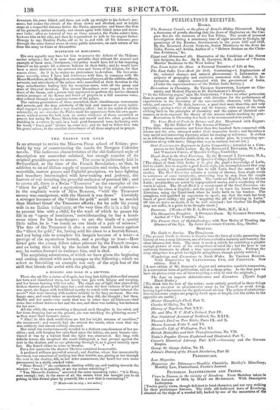THE THIRST FOR GOLD
Is an attempt to revive the Minerva Press school of fiction ; pro- bably by way of counteracting the mania for Newgate Calendar novels. The ludicrous characteristics of the old-fashioned style of description are somewhat subdued, but enough remains of its original grandiloquence to amuse. The scene is judiciously laid in Switzerland, at the time of the French Revolution ; so that, in addition to an ad libitum supply of mountains and rocks, lakes and waterfalls, narrow passes and frightful precipice; we have fighting and treachery intermingled with love-making and jealousy, the horrors of war invading the peaceful seclusion of pastoral life; and to crown all, there is a Swiss "Treasurer" as the exemplar of the "thirst for gold," and a mysterious hermit by way of contrast— in the emphatic words of Miss BURDON, " with the Treasurer money was omnipotent, with the Hermit it was dross." Certainly a stronger instance of the "thirst for gold" could not be needed than Michael Graaf the Treasurer affords; for he sells his young Wife in as Italiaa vGlapturzy, at the very time she I; in fan. v,ny to present him with a child, for the want of which he passes his life in an "agony of loneliness," notwithstanding he has a hand- some niece for his housekeeper: to use the simile of a quaint little tailor, he is "as lonely as one blade of a pair of scissors." The fate of the Treasurer is also a severe moral lesson against the "thirst-for gold ;" for, having sold his niece to a brutish farmer, and not being able to complete his bargain because of a lover—a protege of the mysterious hermit, and a prodigy to boot—Herr Graaf gets the young fellow taken prisoner by the French troops; and on being then told by the hermit that the youth is his own son, he rushes forward to embrace him, and is shot.
The surprising adventures, of which we have given the beginning and ending, abound with such passages as the following ; which we select as furnishing an example not only of the style but of the skill that blends the awful with the playful.
A HEROINE AND HOLE IN A SHOTTER.
There she sat like a statue of despair, her long hair falling dishevelled around her torn and disordered dress, her lovely face pale with fatigue and weeping, and her bosom heaving with her sobs. The single ray of light that pierced the broken shutter gleamed full upon her ; and when the first violence of her grief was spent, she began with bewildered apathy to watch with vacant interest the moats • that were dancing with restless velocity in the long sunbeam. She was happy once, and could dance as carelessly as they did, she thought ; but then, Staffer and her uncle—the uncle that was in other days all kindness—had come like a cloud between her and the sun, and there was nothing but darkness for her now.
All the while she was revolving a thousand such thoughts in her mind, and her tears dropping fast on the ground, she was watching the glittering moats • as they wove their fantastic dance. " Alas! in this dark world there are but few bright streams of sunshine," she murmured : and scarcely had she uttered the words, when even that ray was suddenly and almost entirely obscured.
Her mind was instantaneously recalled to a distinct consciousness of her po- sition ; and, still keeping her eyes fixed upon the lattice, she soon became con- vinced it was by a human head the light was obstructed. Ere long, with infinite terror, she imagined she could distinguish a face pressed against the rent in the shutter, and an eye glistening through it, as it gazed intently upon her. She feared either to move or breathe. • . • For a few moments the shadow likewise remained immoveable.
A profound stillness prevailed around ; and Justine, whose fear momentarily increased, was conscious of nothing but that terrible eye, glaring at her through the rent in the shutter, till, to her utter amazement, she heard her own name pronounced in a shrill, cracked voice. " Hans Brunk !" she exclaimed, starting wildly up, and rushing towards the window : "can it be possible, or are my senses wandering ?"
"Yes, Mamselle Justine," answered the same squeaking voice; "it is Hans, sure enough : but, in the name of all the saints, what has brought you to sit poking in this dismal place by yourself, like a cow that is ruminating? "
Moats—sic in orig.; nut motes.)


























 Previous page
Previous page